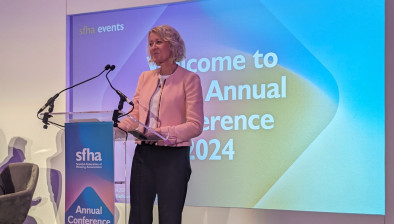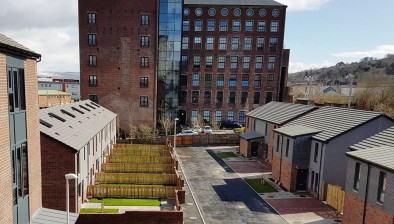Builders outline deliverability concerns following government’s housing commitments

Nicola Barclay
Industry body Homes for Scotland (HFS) has welcomed the Scottish Government’s commitment to increased levels of affordable housing whilst warning of deliverability concerns across homes of all tenures in light of material shortages and cost pressures.
Plans to deliver 110,000 affordable homes by 2032 were set out by the First Minister yesterday in this year’s Programme for Government (PfG).
Nicola Sturgeon said: “We will build also on our investment in housing over the last parliament, to further improve the availability of good quality, affordable, energy-efficient homes.
“I can confirm that we will invest almost £3.5 billion in this parliamentary term to progress our commitment to an additional 110,000 affordable homes across Scotland.
“At least 70% of these will be for social rent. This Scottish Government funding will support a total investment of £18bn. As well as delivering affordable homes, this investment will support up to 15,000 jobs.”
The First Minister also confirmed that the Scottish Government will invest at least £1.8bn over the course of this parliament to make homes and buildings easier and greener to heat.
“This will enable the decarbonisation of one million homes by 2030,” she added.
HFS chief executive Nicola Barclay said: “With public and private housing delivery so crucial to our social and economic outcomes, the announcement of an extra 10,000 affordable homes as a result of the recent SNP-Green co-operation agreement is very much welcomed.
“However, the present issues surrounding material shortages and consequent price increases are causing significant difficulties for all housing developers, regardless of tenure. Unless the situation quickly returns to more normalised levels, we could see longer term problems being created.
“This is also the case with the planning and regulatory systems which are in need of increased resources to enable local councils to cope with the levels of demand for new homes. Although the move to a digital planning application platform, as announced in today’s Programme, is encouraging, active support for more homes must go much further than that, as we emphasised in our recent response to the Scottish Government’s call for views on economic transformation.”
A disappointing omission from the Programme for Government in Ms Barclay’s view was the lack of any substantial assistance, beyond LBTT relief, for first time buyers (FTBs).
“One of the document chapters is ‘Scotland as a Land of Opportunity’ which talks about supporting young people and promoting a fairer and more equal society,” she said. “In the context of the disadvantage now facing FTBs as a result of the sudden closure of the First Home Fund and main Help to Buy scheme earlier this year, coupled with the fact that 82% of Scotland’s population aspire to own their own home, it is disappointing not to see any policy intentions on this.
“This is in stark contrast to other parts of the UK where the First Homes initiative has recently been launched, providing discounted home ownership as an integral part of affordable housing delivery. Only by providing the full range of housing options will we meet the needs of our population.”

Sally Thomas
The Scottish Federation of Housing Associations (SFHA) said the Programme for Government acknowledges the “significant role” of the social housing sector in the country’s recovery from Covid but added that the investment needed to support the new Affordable Housing Supply Programme must be kept under review to realise the Scottish Government’s target of 110,000 affordable homes by 2032.
SFHA chief executive Sally Thomas said: “It is crucial that we focus on delivering a fair and equal social and economic recovery from the pandemic, and the confirmation today of the target of 110,000 affordable homes by 2032 is a welcome acknowledgement of the significant role our sector has to play.
“However, the cost of building homes is rising, and our members are increasingly experiencing supply chain issues, so we are calling on the government to keep funding under review throughout this parliament to ensure it remains adequate.
“The commitment to £1.8bn for energy efficiency upgrades and renewable heating deployment is welcome, but will not be sufficient for the scale of improvement required to meet ambitious climate change targets. With over a third of social housing tenants living in fuel poverty, it’s critical that achieving net zero emissions in social housing doesn’t exacerbate this; no tenant should be left with costs they can’t afford or heating systems that don’t work for them. We need a clear action plan which goes beyond today’s announcements and responds to the recent Zero Emissions in Social Housing Taskforce report. The new National Public Energy Agency is a promising development and we look forward to working with the Scottish Government to take the next steps on this vital issue.”

Hannah Smith
Institution of Civil Engineers Scotland director Hannah Smith added: “Our infrastructure is the foundation for our society and economy – but it is facing a resiliency crisis. From transport networks to buildings such as schools and hospitals, portions of the infrastructure on which we all rely are not fit for purpose.
“This problem will endure, so while commitments to end Scotland’s contribution to climate change and enhance our climate resilience are to be welcomed, there is a disappointing lack of policy detail as to how increased resiliency will be delivered.
“Our members will continue to do all they can but the Government must urgently do more to help ensure our infrastructure can withstand the challenges ahead.”
















